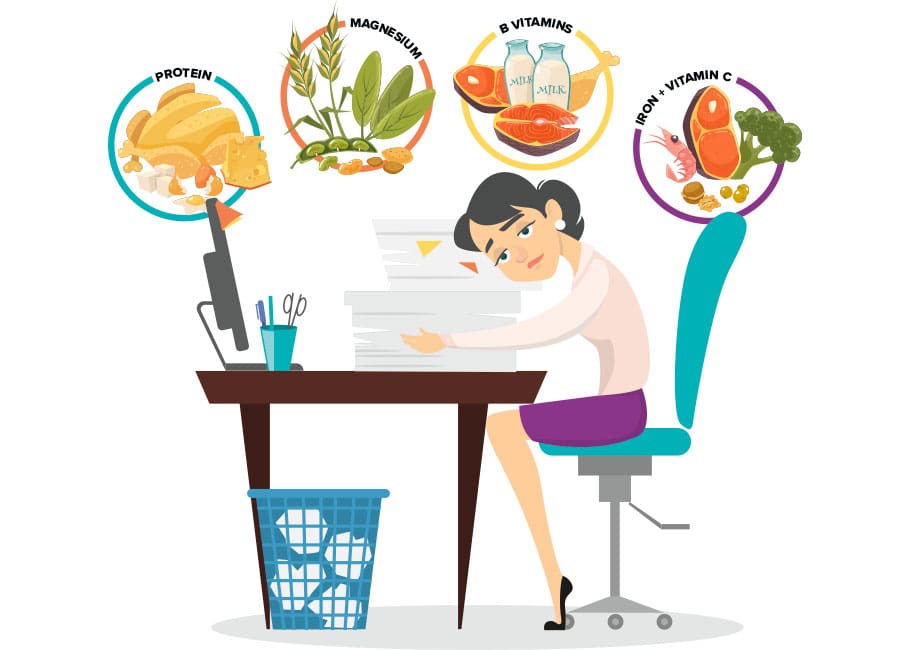
Fight fatigue
Changing what you put into your body may help the energy you are able to put out
Feeling sluggish? Over 30% of Canadian workers report feeling fatigued most of the time or every day in a typical workweek, according to The Conference Board of Canada.
Medical conditions, stress, physical exertion and lifestyle factors may cause persistent exhaustion. Turning to processed foods and energy drinks may provide a temporary burst of energy, but a crash often follows. Instead, a well-balanced diet can provide steady energy throughout the day. Here’s how.
Protein
According to the British Journal of Nutrition, a daily breakfast, especially one rich in protein, provides sustained energy throughout the day.
Good protein sources include poultry, nuts, eggs, cheese and tofu. Andrea D’Ambrosio, a registered dietitian and Costco member in Ontario, suggests eating protein-rich foods such as lean meat, fish, eggs, beans, legumes, dairy or dairy alternatives and yogurt.
Magnesium
Low magnesium levels can deplete energy levels. Magnesium can improve your sleep quality and help you feel more rested and energized.
Leafy green vegetables, beans, nuts, legumes and whole grains are high in magnesium. While magnesium supplements could boost energy levels, always consult your doctor before taking any supplements.
Complex carbohydrates
The body gets its energy mainly from carbohydrates. A mix of complex carbs, protein and healthy fats provides long-lasting energy. Complex carbohydrates supply nutrients and fibre that control blood sugar levels and provide a sense of satiety, sustaining energy levels. By including complex carbohydrates in all meals, you can avoid a spike or dip in energy levels between meals or throughout the day, says British Columbia–based Costco member Annie Tsang, a registered dietitian.
Whole-grain items, like whole-wheat bread, whole-grain cereal and brown rice, are excellent sources of complex carbs. Avoid processed carbs such as white bread, white rice, snacks, sweets, added sugars and pastries, which quickly deplete energy.
B vitamins
Vitamin B12 is crucial for making red blood cells, which deliver oxygen to all parts of the body. A B12 deficiency can result in fatigue and weakness.
Meat, poultry, fish and dairy products are good sources of vitamin B12. You can obtain the full spectrum of B vitamins by consuming a variety of foods. Talk to your doctor before adding any supplements to your routine, says D’Ambrosio.
Iron
Iron delivers blood to nourish all the cells and tissues of the body, says Tsang. Low levels of iron could result in brain fog, dizziness and weakness.
Seafood, enriched grains, spinach, kidney beans, chickpeas, tofu, lentils and meat are excellent sources of iron. Pair foods rich in vitamin C and iron-rich foods at the same meal to enhance iron absorption—for example, lentils and red bell peppers, healthy greens and lemon juice, or oatmeal with blueberries.
CoQ10
Coenzyme Q10 (CoQ10) is an antioxidant that aids in generating energy in the cells. The body naturally produces CoQ10, which is abundant in the heart, kidneys, liver and pancreas. However, the production of CoQ10 decreases as you age.
Organ meats, oily fish and whole grains are among the primary dietary sources of CoQ10. Studies suggest that taking CoQ10 supplements may help fight certain heart disorders, diabetes and Parkinson’s disease, and reduce blood pressure. Consult your doctor before taking any supplement.
Potassium
Potassium is one of the critical macro minerals (minerals required in relatively large quantities by the body) responsible for various functions, including energy production. Potassium deficiency may cause weakness, fatigue, muscle aches and cramps.
Significant sources of potassium include potatoes, bananas, lentils, beans, milk, yogurt, tomatoes and spinach.
Good nutrition, hydration, sleep and exercise are beneficial for sustained energy. See a doctor if your fatigue persists for two or more weeks, and discuss it with your doctor before taking a supplement.

Can coffee make you tired?
As a stimulant, caffeine boosts energy levels, but it can also make you feel tired. Caffeine blocks adenosine receptors from receiving adenosine, the chemical that regulates the sleep-wake cycle, particularly the initiation of sleep. However, it doesn’t affect the production of adenosine molecules. When the caffeine wears off, the buildup of adenosine makes you tired. In addition, too much sugar in the coffee spikes blood glucose levels, with crashes shortly after that, causing a drop in energy. Consume no more than 400 milligrams of caffeine (four or five cups of coffee) per day, and stay hydrated to avoid a caffeine crash.—SN
Post-lunch slump
The post-lunch slump is a common experience. According to the National Sleep Foundation, people’s circadian rhythm drops significantly between 2 and 5 p.m., resulting in a period of decreased alertness called the post-lunch dip. Digesting a heavy lunch can worsen the effect. A brief nap, a brisk walk outside or eating a low-carb breakfast or lunch can help you fight the afternoon crash.—SN
Costco Connection: Costco carries a wide variety of healthful foods, as well as vitamins, supplements and more, in Costco warehouses and at Costco.ca.

